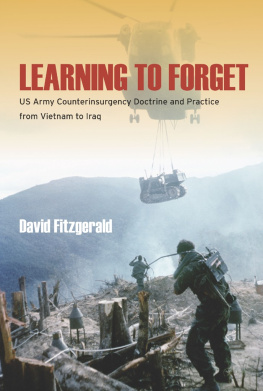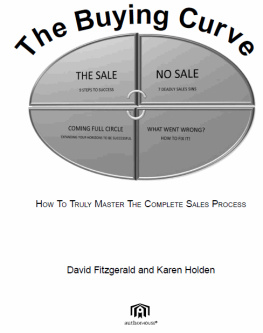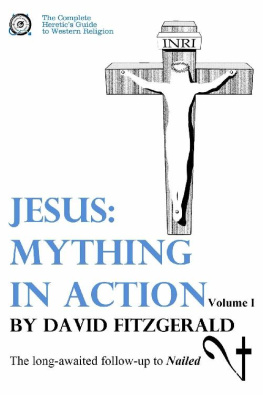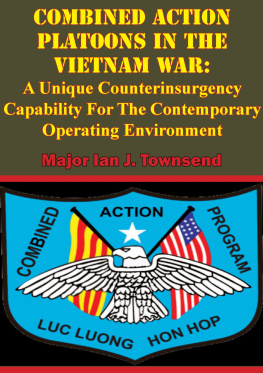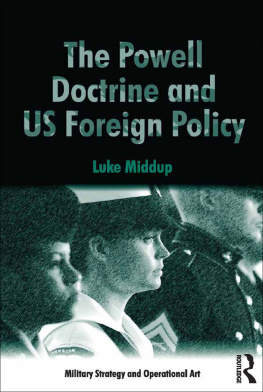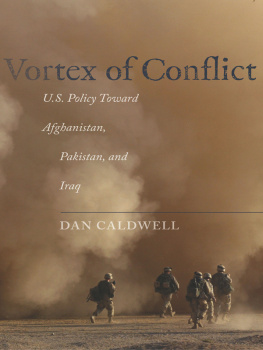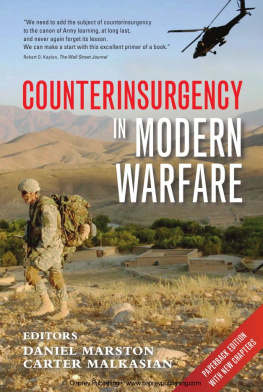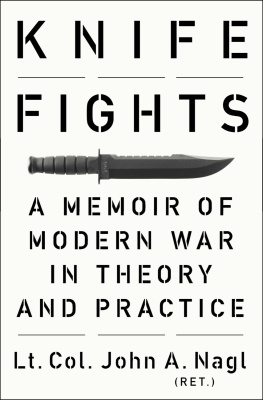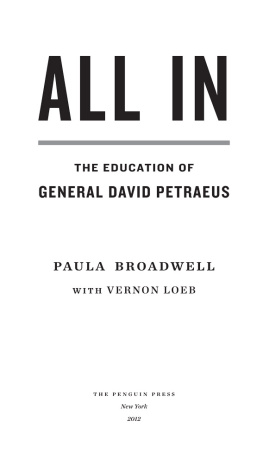Stanford University Press
Stanford, California
2013 by the Board of Trustees of the Leland Stanford Junior University.
All rights reserved.
No part of this book may be reproduced or transmitted in any form or by any means, electronic or mechanical, including photocopying and recording, or in any information storage or retrieval system without the prior written permission of Stanford University Press.
Special discounts for bulk quantities of Stanford Security Studies are available to corporations, professional associations, and other organizations. For details and discount information, contact the special sales department of Stanford University Press. Tel: (650) 736-1782, Fax: (650) 736-1784
Printed in the United States of America on acid-free, archival-quality paper
Library of Congress Cataloging-in-Publication Data
Learning to forget : US Army counterinsurgency doctrine and practice from Vietnam to Iraq / David Fitzgerald.
pages cm
Includes bibliographical references and index.
ISBN 978-0-8047-8581-5 (cloth : alk. paper)
1. CounterinsurgencyUnited StatesHistory. 2. United States. ArmyHistory. 3. Vietnam War, 19611975United States. 4. Vietnam War, 19611975Influence. 5. Iraq War, 20032011. I. Title.
U241.F58 2013
355.02'18097309045dc23
2012043943
ISBN 978-0-8047-8642-3 (electronic)
Typeset by Thompson Type in 10/14 Minion
Learning to Forget
US ARMY COUNTERINSURGENCY DOCTRINE AND PRACTICE FROM VIETNAM TO IRAQ
David Fitzgerald
Stanford Security Studies
An Imprint of Stanford University Press
Stanford, California
For Sarah
CONTENTS
ACKNOWLEDGMENTS
In the writing of this book I have incurred considerable debts of gratitude to a number of people, and I am happy to have the opportunity to thank them, however inadequately, here. First on the list of those to be thanked must be my familymy parents and my sister Claire. It was they more than anyone else who were therequite literallyfrom the start and put up with conversations (usually more like monologues) about the thesis and then the book for what must have seemed like an interminable length of time. Despite all this, their love and support never wavered.
This book began as doctoral dissertation in University College Cork and was finished there when I returned as a staff member. I could not imagine a better home in which to study and work than the School of History. In particular, Sarah-Anne Buckley, Mike Cullinane, James Ryan, and John Borgonovo have provided wonderful friendship and support over the years. Many of the revisions from thesis to book took place during my time at the Clinton Institute for American Studies in University College Dublin, where Liam Kennedy and Catherine Carey have created an extraordinary scholarly community. I owe them a debt of gratitude for welcoming me into that community.
I would also like to recognize the intellectual contribution and support provided by a number of scholars. The two anonymous reviewers helped me sharpen my argument, while John Dumbrell and Geoff Roberts were generous and helpful examiners. Geoffs help in preparing the manuscript for publication was invaluable. Joe Lee was immensely generous to me throughout my time at New York University, and Marilyn Youngs wit, passion, and intellect have been (and continue to be) inspirational, while Anders Stephansons critical rigor strongly enhanced this study at a crucial phase in its development. I have greatly benefitted from conversations with T. X. Hammes, Tim Hoyt, Andrew Mumford, Lydia Walker, Steven Metz, Andrew Birtle, and Conrad Crane. Professor Crane was also instrumental in assisting me in my research at the Military History Institute, while David Keough and Jessica Sheets at the Military History Institute, Richard Boylan at NARA, and Wanda Williams at the Nixon Archive were all helpful in helping me navigate through the vastness of the archives. Funding was provided by the College of Arts, Celtic Studies and Social Sciences and the Department of History at University College Cork, and the Department of Arts, Sports and Tourism of the Irish Government, who funded my fellowship at NYU. Thanks are also due to the National University of Ireland, who generously helped to defray the publication costs of this volume via their grants toward scholarly publications scheme. I also want to thank Geoffrey Burn of Stanford University Press, who saw potential in this project and has been extraordinarily professional and supportive throughout the process.
My primary intellectual debt is to David Ryan, my supervisor and mentor, who has been extraordinarily generous with his time, advice, and library. David contributed immensely to my intellectual and professional development and he has been an astute critic, a reader, a counselor, a role model and, most importantly, a friend. Sarah Thelen has commented on and critiqued virtually every draft of every chapter and has given me so much support on this project that words cant express the thanks I owe her. Sarah is not only smarter than I am but a much better writer, and this book would not be nearly as readable without her input. I cant blame her for the errors, though, as she seems to have developed some form of academic Stockholm syndrome along the way and become far more interested in military doctrine and counterinsurgency than I think she ever anticipated. Im incredibly lucky that shes been there to share this journey, which would not have been possible without her, and it is to her that I dedicate this book.
INTRODUCTION
Counterinsurgency and the Uses of History
On Wednesday May 23, 1962, Major General Victor Krulak, special assistant to the Joint Chiefs of Staff for counterinsurgency and special operations, addressed the students and staff of the US Army War College. Krulaks subject was the Tactics and Techniques of Insurgency and Counterinsurgency, and he began his lecture by quoting a passage from Alice in Wonderland, recounting that when Alice asked the White Queen what a word meant, the Queen replied: What does it mean? Why, it means what I mean it to mean. If Krulak admitted that the definition of counterinsurgency was complicated, then a similar dilemma soon extended to the lessons of the ongoing war in Vietnam, which proved even more difficult to characterize and harder to simplify into something that could be meaningfully understood as a lesson. This book concerns itself with understanding how the US Army comprehended the lessons of the war in Vietnam and the concept of counterinsurgency that Krulak struggled to define. It is interested in what the US Army meant both Vietnam and counterinsurgency to meanthat is, the combination of ideology, memory, and identity at work in shaping the Armys constructed understandings of these terms. These various meanings grew out of efforts to process and make sense of the failures in Vietnam.
The lessons of Vietnam have been intensely contested, with disputes over which lessons should be heeded emerging even before the end of American involvement in the war in 1973. Indeed, the struggle over the lessons of Vietnam
This book evolved from an interest in repeated references to Vietnam in narratives of the U.S. war in Iraq. While the analogies could certainly be overwrought and were often overused, the wars in Vietnam and Iraq are linked both through the history of counterinsurgency doctrine within the US Army and the evolving manner in which the US Army understood the Vietnam War in the aftermath of the US retreat from Indochina.
Defeat in Vietnam led the Army to consciously turn away from its experience there and discard what it had learned about counterinsurgency. But the Army could escape neither Vietnam nor counterinsurgency and had to deal with new missions such as low-intensity conflict and peacekeeping that modified its understanding of the lessons of Vietnam. Despite these new missions, the Armys post-Vietnam distaste for counterinsurgency endured. This aversion led to major problems when confronted with insurgency in Iraq. The reasons for both the Armys struggle to deal with this insurgency and its subsequent construction of an entirely new doctrine to address the problems posed by Iraq were deeply rooted in the Vietnam Wars competing lessons. The Armys experience in Iraq is a fascinating case study of how an organization can reshape historical memory in an attempt to make it more useful to present challenges.

